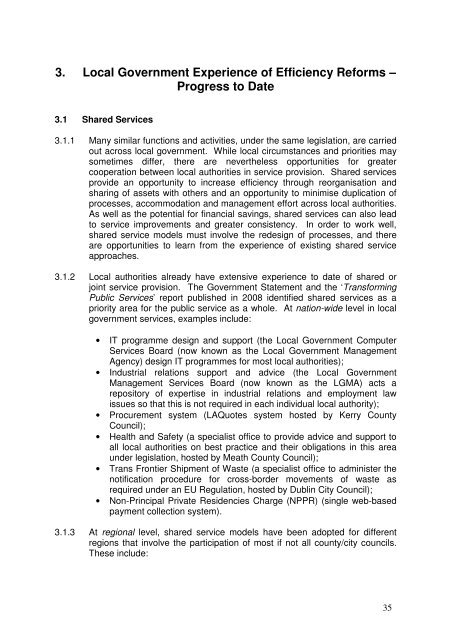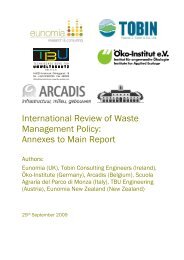Report of the Local Government Efficiency Review Group
Report of the Local Government Efficiency Review Group
Report of the Local Government Efficiency Review Group
You also want an ePaper? Increase the reach of your titles
YUMPU automatically turns print PDFs into web optimized ePapers that Google loves.
3. <strong>Local</strong> <strong>Government</strong> Experience <strong>of</strong> <strong>Efficiency</strong> Reforms –<br />
Progress to Date<br />
3.1 Shared Services<br />
3.1.1 Many similar functions and activities, under <strong>the</strong> same legislation, are carried<br />
out across local government. While local circumstances and priorities may<br />
sometimes differ, <strong>the</strong>re are never<strong>the</strong>less opportunities for greater<br />
cooperation between local authorities in service provision. Shared services<br />
provide an opportunity to increase efficiency through reorganisation and<br />
sharing <strong>of</strong> assets with o<strong>the</strong>rs and an opportunity to minimise duplication <strong>of</strong><br />
processes, accommodation and management effort across local authorities.<br />
As well as <strong>the</strong> potential for financial savings, shared services can also lead<br />
to service improvements and greater consistency. In order to work well,<br />
shared service models must involve <strong>the</strong> redesign <strong>of</strong> processes, and <strong>the</strong>re<br />
are opportunities to learn from <strong>the</strong> experience <strong>of</strong> existing shared service<br />
approaches.<br />
3.1.2 <strong>Local</strong> authorities already have extensive experience to date <strong>of</strong> shared or<br />
joint service provision. The <strong>Government</strong> Statement and <strong>the</strong> ‘Transforming<br />
Public Services’ report published in 2008 identified shared services as a<br />
priority area for <strong>the</strong> public service as a whole. At nation-wide level in local<br />
government services, examples include:<br />
• IT programme design and support (<strong>the</strong> <strong>Local</strong> <strong>Government</strong> Computer<br />
Services Board (now known as <strong>the</strong> <strong>Local</strong> <strong>Government</strong> Management<br />
Agency) design IT programmes for most local authorities);<br />
• Industrial relations support and advice (<strong>the</strong> <strong>Local</strong> <strong>Government</strong><br />
Management Services Board (now known as <strong>the</strong> LGMA) acts a<br />
repository <strong>of</strong> expertise in industrial relations and employment law<br />
issues so that this is not required in each individual local authority);<br />
• Procurement system (LAQuotes system hosted by Kerry County<br />
Council);<br />
• Health and Safety (a specialist <strong>of</strong>fice to provide advice and support to<br />
all local authorities on best practice and <strong>the</strong>ir obligations in this area<br />
under legislation, hosted by Meath County Council);<br />
• Trans Frontier Shipment <strong>of</strong> Waste (a specialist <strong>of</strong>fice to administer <strong>the</strong><br />
notification procedure for cross-border movements <strong>of</strong> waste as<br />
required under an EU Regulation, hosted by Dublin City Council);<br />
• Non-Principal Private Residencies Charge (NPPR) (single web-based<br />
payment collection system).<br />
3.1.3 At regional level, shared service models have been adopted for different<br />
regions that involve <strong>the</strong> participation <strong>of</strong> most if not all county/city councils.<br />
These include:<br />
35
















